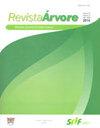去除再生个体对植物群落幼苗库动态的影响
IF 0.8
4区 农林科学
Q4 FORESTRY
引用次数: 0
摘要
摘要:森林苗库被推荐用于生产特定森林类型中繁殖困难的物种所需的幼苗。然而,由于缺乏对人类干预(例如从森林中移除再生个体)如何影响植物群落组成和结构的了解,因此迫切需要进一步研究。我们的主要目标是确定除苗对森林群落自然更新的影响,并描述人为干预三年后幼苗库的动态特征。实验采用随机区组设计,包括5种去除强度(0、25、50、75和100%去除),每3个月进行一次评估,持续3年。测量了5 ~ 55 cm高度灌木-乔木组分的所有个体。对收集到的数据进行分析,确定个体迁移对幼苗群落的影响以及环境因素对幼苗群落的影响。我们发现,森林群落的灌木-乔木组分在再生个体移除3年后表现出明显的恢复力。去除高达50%的再生个体似乎不会干扰植物群落动态,这表明幼苗库中个体密度高的物种对人类干预的影响具有弹性。虽然气候季节性也会影响植物群落的幼苗库动态,但这种影响取决于一个地区的人为干预水平,因此在分析中被省略。本文章由计算机程序翻译,如有差异,请以英文原文为准。
EFFECT OF THE REMOVAL OF REGENERATING INDIVIDUALS ON THE SEEDLING BANK DYNAMICS IN PLANT COMMUNITIES
ABSTRACT The use of forest seedling banks is recommended for producing seedlings of species essential for specific forest typologies for which propagation poses challenges. However, given the lack of understanding of how human intervention, such as the removal of regenerating individuals from the forest, influences the composition and structure of the plant community, there is a pressing need for further research. Our primary objective here was to identify the effects of seedling removal on natural regeneration in forest communities and to characterize seedling bank dynamics three years after anthropogenic intervention. A randomized block design was used for the experiment, consisting of five removal intensities (0, 25, 50, 75, and 100% removal), with evaluations conducted every three months for three years. All individuals of the shrub-arboreal component between 5-55 cm heights were measured. Collected data were analyzed to determine the impacts of the removal of individuals and the influence of environmental elements on the seedling community. We found that the shrub-arboreal component of the forest community exhibited marked resilience three years following the removal of regenerating individuals. Removal of up to 50% of regenerating individuals does not appear to interfere with plant community dynamics, suggesting species with a high density of individuals in the seedling bank are resilient to the impacts of human intervention. Although climatic seasonality also affects seedling bank dynamics in plant communities, this effect depends on the level of human intervention in an area and, therefore, has been omitted from the analysis.
求助全文
通过发布文献求助,成功后即可免费获取论文全文。
去求助
来源期刊

Revista Arvore
FORESTRY-
CiteScore
1.00
自引率
0.00%
发文量
32
审稿时长
4-8 weeks
期刊介绍:
A Revista Árvore é um veículo de comunicação científica da Sociedade de Investigações Florestais – SIF. O jornal é de acesso gratuito, revisado por pares, que publica bimestralmente trabalhos científicos originais no campo da Ciência Florestal. As áreas temáticas para publicação são: Ambiência e Conservação da Natureza, Manejo Florestal, Silvicultura e Tecnologia da Madeira e Utilização de Produtos Florestais.
A política editorial visa manter alta conduta ética em relação à publicação e aos seus funcionários, rigor na qualidade dos artigos científicos, seleção de revisores qualificados, respeito profissional aos autores e processo de tomada de decisão imparcial. A Revista Árvore publica artigos apenas em inglês.
Artigos de revisão podem ser publicados se houver uma discussão relevante resumindo o estado da arte sobre o assunto. A revisão estrita da literatura não é aceita.
 求助内容:
求助内容: 应助结果提醒方式:
应助结果提醒方式:


